Lady Macbeth of Mtsensk
Lady Macbeth of Mtsensk. 2006. GB. DVD (NTSC, Region 0). Opus Arte. 236 minutes (2 discs). Price £29.99. www.opusarte.com
 About the reviewer: John Riley is a writer, lecturer, curator and broadcaster. He is the author of Shostakovich: A Life on Film (I.B. Tauris, 2006) and Discover: Film Music (Naxos, 2008) and contributed chapters to The Cambridge Companion to Shostakovich (2008), Contemplating Shostakovich: Life, Music and Film (2012) and The Sounds of the Silents in Britain (2012), among others. He is a regular contributor to The Independent newspaper. He wrote, directed and produced the evening-long show ‘Shostakovich – My Life at the Movies’ for the South Bank Centre. It was premiered by the CBSO with Simon Russell Beale and was then produced at the Komische Oper, Berlin, with Ulrich Matthes.
About the reviewer: John Riley is a writer, lecturer, curator and broadcaster. He is the author of Shostakovich: A Life on Film (I.B. Tauris, 2006) and Discover: Film Music (Naxos, 2008) and contributed chapters to The Cambridge Companion to Shostakovich (2008), Contemplating Shostakovich: Life, Music and Film (2012) and The Sounds of the Silents in Britain (2012), among others. He is a regular contributor to The Independent newspaper. He wrote, directed and produced the evening-long show ‘Shostakovich – My Life at the Movies’ for the South Bank Centre. It was premiered by the CBSO with Simon Russell Beale and was then produced at the Komische Oper, Berlin, with Ulrich Matthes.
By January 1936 Shostakovich’s opera Lady Macbeth of Mtsensk had been a huge popular and critical hit for almost two years. But then Pravda’s review Chaos Instead of Music changed his life forever. The phrase ‘things could end badly’ led him to sleep on the landing with a ready-packed suitcase so that the arrest he thought inevitable would not disturb his family.
The blistering masterpiece, an intensely personal work, was banned. Revived in the 1960s as Katerina Izmailova, the text and music were bowdlerised, reducing the impact of the story of a sexually frustrated woman who takes a lover and kills her husband and father-in-law before, cast aside, she drags her love-rival into a freezing river to commit her third murder and simultaneous suicide. Though much actually remained relatively untouched, the infamous sex scene – aptly described as ‘pornophony’ – had to go. Naturally the 1966 Soviet film, directed by Mikhail Shapiro, used the expurgated version, but since Shostakovich’s death the mania for ‘originals’ has generally cast Katerina aside.
 Shostakovich’s phrase ‘tragedy-satire’ sums up his interweaving of horror and comedy: Martin Kušej, describing his production as ‘orgasm and murder’, existentially links sex and power in this production, filmed in Amsterdam in June 2006. The blue-lit glass-cage set makes us feel like voyeurs or punters at a clip joint (no chance to expose the cast’s corporeality is lost), and Aksinya’s rape is as revolting as it should be. But the stroboscopic sex-scene prudishly distances us, and the interludes cut-away to the conductor, breaking the mood; in the theatre they simply brought down the curtain, leaving us to contemplate what we had just witnessed.
Shostakovich’s phrase ‘tragedy-satire’ sums up his interweaving of horror and comedy: Martin Kušej, describing his production as ‘orgasm and murder’, existentially links sex and power in this production, filmed in Amsterdam in June 2006. The blue-lit glass-cage set makes us feel like voyeurs or punters at a clip joint (no chance to expose the cast’s corporeality is lost), and Aksinya’s rape is as revolting as it should be. But the stroboscopic sex-scene prudishly distances us, and the interludes cut-away to the conductor, breaking the mood; in the theatre they simply brought down the curtain, leaving us to contemplate what we had just witnessed.
Mingling horror and comedy is hard and many productions miss the balance. Here the down-trousered drunk begs for more slapstick staggering as, accompanied by delirious music, he prepares to run to the police to denounce the murderers, whereas the priest, rather than becoming increasingly ridiculous, is drunk from the start. But conductor Maris Jansons is an old-hand at Shostakovich: musically we are on firm ground and the cast and chorus are outstanding.
The two discs are generously chaptered, though the disc break – apparently Jansons’ decision – is just into Act 3. Classical music and opera DVDs are finally beginning to include the kinds of extras that are standard with feature films and there is The Tragedy of Katerina Ismailov, a 65-minute documentary in which cast and crew discuss the production. Kušej’s comments are particularly valuable: whether or not you agree with him, his rationale is clearly laid out.
There are currently three apparent DVD rivals although sadly licensing problems mean that the BBC broadcast of English National Opera’s aptly hallucinogenic production (set in a semi-abattoir) is unlikely to appear. Shapiro’s Soviet film (44007 43137) stands alone as the revised version, with Galina Vishnevskaya’s Katerina as compelling a performance as you could hope to see. Peter Weigel (ID 5655 CLDVD) uses actors miming to Rostropovich’s recording (admittedly heavily cut), very effectively turning it into a proto-noir. Finally, EMI (7243 5 99730 9 8) trails behind, lugubriously conducted and with one of the interludes extended with a chunk of the Sixth Symphony. So, none are in fact exact rivals. The ardent will want all four, but this latest release and Shapiro’s film top the list.
John Riley

 Learning on Screen
Learning on Screen